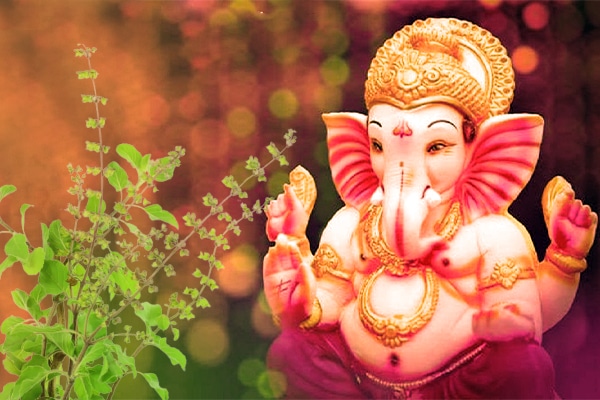
Informative
Why Are Tulsi Leaves Never Offered to Lord Ganesha?
While Tulsi (Holy Basil) leaves are considered an important part of every ritual and worship in the traditional customs, these sacred leaves are never offered to Lord Ganesha. There’s an interesting story behind this ban and here’s how it goes.
Once upon a time, in the divine realms of Hindu mythology, there
lived a beautiful and devout goddess named Tulsi. She was known for her unwavering devotion and her ethereal beauty that attracted the attention of both gods and mortals.
One day, as fate would have it, Lord Ganesha was deep in meditation. He sat regally on a magnificent jeweled throne, His divine presence radiating tranquility and wisdom. His tranquil state drew the curiosity of Goddess Tulsi, who had never seen anyone as enchanting as Lord Ganesha.
Fascinated by his divine aura and grace, Maa Tulsi felt a strong fascination. She longed to marry Lord Ganesha and share Her life with the deity who embodied wisdom and benevolence. With a heart full of hope and yearning, She approached Lord Ganesha and expressed her wish to be His consort.
However, Lord Ganesha, was following celibacy back then. He gently declined Maa Tulsi’s proposal. He explained that His purpose was to serve as a guardian and protector, devoid of worldly attachments and desires.
Maa Tulsi, was overcome by anger and disappointment due to this rejection. In Her frustration, She uttered a curse. She cursed Lord Ganesha to experience not one, but two marriages in his lifetime, a fate He had never before been destined to bear.
In response to Maa Tulsi’s curse, Lord Ganesha was filled with righteous indignation. He, too, issued a curse in return. He proclaimed that She would be married to an Asura, a demon, as a consequence of her hasty actions.
Realizing the gravity of Her actions and the curses that had been cast upon both of them, Maa Tulsi immediately regretted Her words and sought forgiveness from Lord Ganesha. She bowed before him, Her eyes filled with remorse and repentance.
Lord Ganesha, in His infinite compassion, accepted the apology. He assured her that Her fate would indeed intertwine with that of the demon ‘Shankha Churna,’ as foretold by his curse. Moreover, He revealed a divine destiny for Tulsi. She would become the one who gives life and salvation to the world in the age of Kaliyuga. She would also hold a special place in the hearts of Lord Vishnu and Lord Krishna.
Despite their reconciliation, Lord Ganesha cautioned Tulsi that offering Her leaves in his worship would not be deemed auspicious. Thus, the tradition emerged that offering Tulsi leaves to Lord Ganesha during worship is considered inauspicious in Hinduism, as it is believed to be associated with this ancient tale of curses and blessings.
And so, the story of Tulsi and Lord Ganesha serves as a reminder of the complexities and wisdom found within Hindu mythology, where even the curses and blessings are interwoven with profound significance.We hope you enjoyed reading this story. Please subscribe to our mailing list to stay connected and receive spiritual information.
In case of any queries, please write to us at info@chamundaswamiji.com. You can check out our YouTube channel, Chamunda Swamiji, where you can learn Tantra, Mantra, Yantra, and Meditation from His Holiness Shri Chamunda Swamiji. If you seek to learn Shakti Kriya, please register with us, and we will get back to you.
Post a Comment
-
Subscribe to Our Blog
-
Categories
-
Popular Articles
- Dead moth in the house. What universe is trying to tell you?
- Spiritual Meaning of Moth
- Vivah Bandhan Curse – What Is It and How to Spiritually Heal It.
- The Dasa Mahavidyas
- What are Beej Mantras?
- Tripura Sundari | The Dasa Mahavidya
- Maa Bhuvaneshwari | The Dasa Mahavidyas
- The Five Shades of Tantra
- Ramakrishna Paramhansa – The Man who almost became a Woman
- Maa Chinnamasta | The Dasa Mahavidyas



